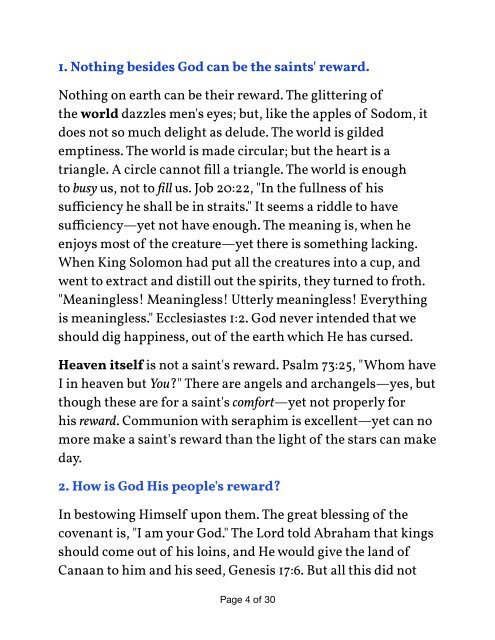God is His Peoples Great Reward by Thomas Watson 1620-1686
Thomas Watson is no doubt one of the most well-beloved of all of the Puritan authors. Few better guides have existed in this or any other area of spiritual experience than Thomas Watson. He was a master of both Scripture and the human heart, and wrote with a simplicity and directness that keeps his work fresh and powerful for the twenty-first century. Watson was educated at Emmanuel College, Cambridge, where he was noted for remarkably intense study. In 1646 he commenced a sixteen year pastorate at St. Stephen's, Walbrook. He showed strong Presbyterian views during the civil war, with, however, an attachment to the king, and in 1651 he was imprisoned briefly with some other ministers for his share in Christopher Love's plot to recall Charles II of England. He was released on June 30, 1652, and was formally reinstated as vicar of St. Stephen's Walbrook. Watson obtained great fame and popularity as a preacher until the Restoration, when he was ejected for nonconformity. Notwithstanding the rigor of the acts against dissenters, Watson continued to exercise his ministry privately as he found opportunity. Upon the Declaration of Indulgence in 1672 he obtained a license to preach at the great hall in Crosby House. After preaching there for several years, his health gave way, and he retired to Barnston, Essex, where he died suddenly while praying in secret. He was buried on 28 July 1686.
Thomas Watson is no doubt one of the most well-beloved of all of the Puritan authors. Few better guides have existed in this or any other area of spiritual experience than Thomas Watson. He was a master of both Scripture and the human heart, and wrote with a simplicity and directness that keeps his work fresh and powerful for the twenty-first century. Watson was educated at Emmanuel College, Cambridge, where he was noted for remarkably intense study. In 1646 he commenced a sixteen year pastorate at St. Stephen's, Walbrook. He showed strong Presbyterian views during the civil war, with, however, an attachment to the king, and in 1651 he was imprisoned briefly with some other ministers for his share in Christopher Love's plot to recall Charles II of England. He was released on June 30, 1652, and was formally reinstated as vicar of St. Stephen's Walbrook.
Watson obtained great fame and popularity as a preacher until the Restoration, when he was ejected for nonconformity. Notwithstanding the rigor of the acts against dissenters, Watson continued to exercise his ministry privately as he found opportunity. Upon the Declaration of Indulgence in 1672 he obtained a license to preach at the great hall in Crosby House. After preaching there for several years, his health gave way, and he retired to Barnston, Essex, where he died suddenly while praying in secret. He was buried on 28 July 1686.
- No tags were found...
You also want an ePaper? Increase the reach of your titles
YUMPU automatically turns print PDFs into web optimized ePapers that Google loves.
1. Nothing besides <strong>God</strong> can be the saints' reward.<br />
Nothing on earth can be their reward. The glittering of<br />
the world dazzles men's eyes; but, like the apples of Sodom, it<br />
does not so much delight as delude. The world <strong>is</strong> gilded<br />
emptiness. The world <strong>is</strong> made circular; but the heart <strong>is</strong> a<br />
triangle. A circle cannot fill a triangle. The world <strong>is</strong> enough<br />
to busy us, not to fill us. Job 20:22, "In the fullness of h<strong>is</strong><br />
sufficiency he shall be in straits." It seems a riddle to have<br />
sufficiency—yet not have enough. The meaning <strong>is</strong>, when he<br />
enjoys most of the creature—yet there <strong>is</strong> something lacking.<br />
When King Solomon had put all the creatures into a cup, and<br />
went to extract and d<strong>is</strong>till out the spirits, they turned to froth.<br />
"Meaningless! Meaningless! Utterly meaningless! Everything<br />
<strong>is</strong> meaningless." Ecclesiastes 1:2. <strong>God</strong> never intended that we<br />
should dig happiness, out of the earth which He has cursed.<br />
Heaven itself <strong>is</strong> not a saint's reward. Psalm 73:25, "Whom have<br />
I in heaven but You?" There are angels and archangels—yes, but<br />
though these are for a saint's comfort—yet not properly for<br />
h<strong>is</strong> reward. Communion with seraphim <strong>is</strong> excellent—yet can no<br />
more make a saint's reward than the light of the stars can make<br />
day.<br />
2. How <strong>is</strong> <strong>God</strong> H<strong>is</strong> people's reward?<br />
In bestowing Himself upon them. The great blessing of the<br />
covenant <strong>is</strong>, "I am your <strong>God</strong>." The Lord told Abraham that kings<br />
should come out of h<strong>is</strong> loins, and He would give the land of<br />
Canaan to him and h<strong>is</strong> seed, Genes<strong>is</strong> 17:6. But all th<strong>is</strong> did not<br />
Page<br />
4 of 30

















